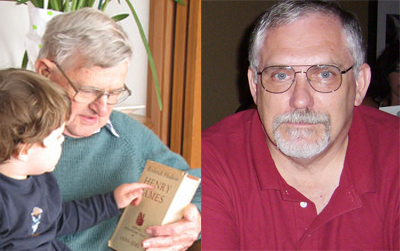 Delen via Facebook
Delen via Facebook Delen via Twitter
Delen via Twitter

Abonneer op RSS feeds
 Nieuws
Nieuws Agenda
Agenda Weblog e-tekstualiteit
Weblog e-tekstualiteit Achtergrond
Deze site is geinitieerd door:
Achtergrond
Deze site is geinitieerd door:
David L. Hoover was invited by the University of Newcastle in Australia to participate in “Language Individuation: A Symposium in Honour of John Burrows”, from 4 – 8 July 2011. Who is John Burrows, how and why is he honoured and what other things are going on at this symposium which are interesting for textual scholars of all kinds?

Burrows was largely responsible for the resurgence of interest in computational approaches to style, first, with his 1987 book, Computation into Criticism, which uses several computational approaches to Jane Austen’s style, and then with a large number of articles. His work, along with that of his colleague Huge Craig, has been very successful in being published in mainstream literary venues like Eighteenth Century Studies, as well as journals that specialize in computational approaches, like Literary and Linguistic Computing.
In 2001 in New York, Burrows received the Busa Award from the Association for Literary and Linguistic Computing and the Association for Computers and the Humanities, a lifetime achievement award for his work in computational stylistics. His talk on that occasion introduced Delta, a new method of authorship attribution that has been widely used since then. Shortly before the symposium, he was named in the Queen’s Birthday Honours List as Member of the Order of Australia, “For service to education in the fields of computational stylistics and English literature as an academic and researcher.”

John Burrows, David Hoover
The symposium was small and intense, with plenty of time for discussion of the presentations, and it lead to many new collaborations and closer contacts among the participants. John Burrows talked about how to investigate changes in authorship in collaborative Renaissance plays, showing that analyzing sections of plays by using a sliding window of overlapping sections allows us to pinpoint changes of authorship. Ian Lancashire pushed the participants to think about the human author as well as the author’s characteristic style by focusing on research in neurology, memory, cognition, the composing process, and on changes in authorial production caused by disease. Tomoji Tabata showed how a new classification technique, random forests, gives new insights into Dickens’s style. Random forests combines the results from a large number of classification trees that are randomly generated and produces a more powerful method of identifying words that contribute most strongly to classification than traditional keyword analysis. Barbara Johnstone focused on ways in which individuals differ in their language abilities and characteristics, an area of research that has been largely overlooked by contemporary linguistics. Her main focus was on stance-taking, using the fascinating example of the American politician Barbara Jordan. My own talk focused on word ngrams and showed that, contrary to expectation, word bigrams and trigrams do not improve authorship attribution in several corpora when used with Burrows’s Delta, Zeta, and Iota. I also tested a method recently used by Brian Vickers that relies on rare 3-6grams, and showed that, in several corpora, these rare phenomena are not very reliable guides to authorship. Willard McCarty discussed the extent to which computational stylistics does or should employ the “scientific method,” and what that method really is in the sciences. There were fascinating shorter sessions by Alexis Antonia, using computational methods to investigate some important anonymous Victorian periodical literature, by Marcus Dahl, using plagiarism detection software to look at rare wordgrams, by Louisa Connors using computational techniques to help to identify the genre and literary context of The Tragedy of Mariam, early play written by a woman. Finally, there was the launch of the latest version of Hugh Craig’s Intelligent Archive, freely available archiving and analysis software.
This collegial, intense, and productive event was a very fitting way of celebrating the work of a remarkable scholar and a remarkable man.
David L. Hoover
David L. Hoover was visiting professor at the Huygens Institute in 2010.
Abstracts “Language Individuation: A Symposium in Honour of John Burrows”
[…] David L. A Symposium in Honour of John Burrows. http://www.textualscholarship.nl/?p=9129 Web. 2015. (accessed 29 October […]